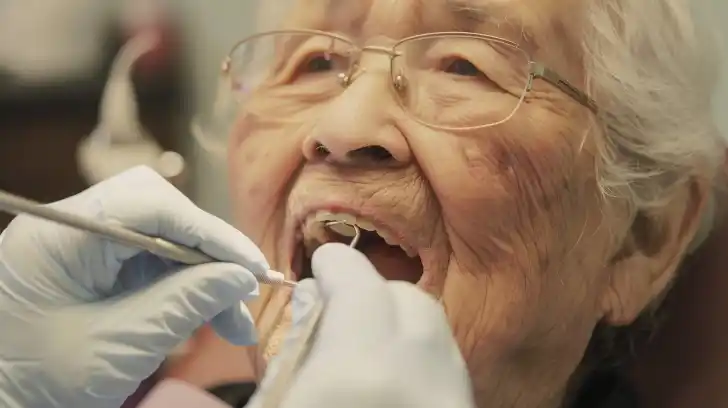Dental implants can be very expensive for seniors, with a single implant costing up to $4,500. But there are surprising ways you can get them for free. Let’s find out how.
First off, check out dental schools near you. Students often need people to practice on and offer services at a much lower cost or even for free. Plus, everything is supervised by professionals to ensure safety and quality.
Non-profit organizations and advocacy groups also help seniors get dental care without breaking the bank. They provide access to resources and might connect you with programs offering free implants.
Consider looking into health centers in your community too. They sometimes have programs specifically designed to assist seniors with healthcare costs, including dental work like implants.
Don’t forget about clinical trials either. Researchers testing new dental procedures or technologies might offer free treatment as part of their study.
And finally, some dentists work on a sliding scale fee system based on your income or offer payment plans that make the cost more manageable over time.
Key Takeaways
- Dental schools often give free implants to seniors. Experts watch over this training.
- The Dental Lifeline Network and Donated Dental Services provide no-cost implants to seniors nationwide.
- Seniors might get grants or use Medicare and Medicaid Plans C and D (PACE) for dental implant costs.
- Community health centers and non – profits sometimes offer programs that help pay for senior dental implants.
- To get free dental implants, seniors must prove they have a low income, no dental insurance, and need the implants medically.
Understanding Free Dental Implants for Seniors

Many older people have trouble with their teeth, leading to tooth loss. In the U.S., over 10 million people don’t have any teeth. A single dental implant can cost between $3,000 and $4,500.
Luckily, there are free dental implant programs in every state to help seniors who need these services but can’t afford them. These programs aim to improve seniors’ lives by letting them eat, talk, and smile better.
To get free dental implants, you must prove you’re eligible. You might need to show how much money you make, your tax documents, and information about your family. Community health centers and geriatric dentistry groups usually run these programs.
They help elders get the tooth replacements they need without worrying about high costs. This support shows a strong dedication to making sure older adults live well by getting the oral health care they need.
Programs Offering Free Dental Implants for Seniors

Free dental implants can give you a new reason to smile. Here are some programs ready to help seniors get back their confidence.
- Dental Lifeline Network: This group helps seniors receive dental services, including no-cost implants. It focuses on those with disabilities or serious medical conditions.
- Donated Dental Services (DDS): A part of the Dental Lifeline Network, DDS aims to provide comprehensive dental care at no charge to needy seniors nationwide.
- Medicare and Medicaid Plans C and D (PACE): These special plans might pay for dental implants if you’re 55 or older. You must qualify first.
- Educational Institutions: University dental schools often offer treatments at reduced prices as part of student training. Seniors can get top-notch care, such as implants, under expert supervision.
- American Dental Association (ADA) Foundation: The ADA hands out grants and other forms of aid focused on helping elderly people in need of dental care.
- State Health Departments: Look into your state’s health department for programs that provide subsidized or free dental services for seniors.
- Senior Associations and Community Centers: These local places sometimes team up with healthcare providers who offer complimentary clinics and implant services for older adults.
- Religious Institutions: At times, churches host events where seniors can get access to free oral healthcare.
You may find the right treatment option without worrying about costs by checking these resources.
Eligibility Requirements for Free Dental Implants
To get dental implants at no cost, you must fit specific criteria. Here’s what you need:
- You should be a senior, typically 65 or older.
- Your income must be low. Show proof that your earnings are below a set limit.
- Being on Medicare (Plans C and D) or Medicaid helps, especially with PACE.
- You have to prove that you really need dental implants for health reasons.
- If you don’t have insurance that pays for implants, this increases your chances.
- Some programs only help if you live in certain areas or states.
- Preference is often given to those applying for the first time.
- Bring documents like a government ID, proof of income, medical records about needing implants, and maybe a letter from your doctor.
These steps guide seniors toward programs offering free dental implants to boost oral health and overall happiness.
How to Apply for a Dental Implant Grant
Ready to get dental implants? Here’s how:
- Find groups that give grants for seniors’ dental work. Look into charities, dental associations, and health advocacy groups.
- Collect all needed documents first. You need proof of income, ID, and medical records about your teeth.
- Fill out the application form with care. Share details about your money situation and why you need implants.
- If they ask for a personal statement, explain how implants would make your life better.
- Send in your application by their deadline. Follow their rules closely when submitting.
- Wait for them to confirm they got your application. Keep track of where and when you sent it.
- Get ready for an interview or more questions if they ask. Some programs might want to talk more about your needs.
- Regularly check emails and mail for updates on your application or what to do next.
- If you’re approved, plan your treatment with the program’s help at a chosen clinic or hospital.
- Do any extra paperwork needed by the grant program or dentist to make sure you’re all set for treatment.
Financing Options for Senior Dental Care
You have many ways to pay for dental care. Each option gives you different benefits.
Dental Insurance
Dental insurance helps seniors afford dental implants. Companies like Cigna, Renaissance Dental, and Humana have plans covering these procedures. This support eases the financial burden of improving dental health.
It’s important to know your insurance options for better oral care decisions.
For those 55 and older, Medicare and Medicaid offer Plans C and D (PACE). These plans often cover dental implants along with other vital services. Looking into these options can lead to affordable dental care.
They help ensure seniors get the treatments they need without spending too much money.
Dental Financing Options
Seniors often worry about dental care costs, especially for implants. Companies like Cigna, Renaissance Dental, and Humana offer dental insurance plans. These plans cover treatments such as implants and spread the costs over time.
If you don’t have insurance or need extra help, consider dental loans. Dental loans let you pay in installments. This makes paying for expensive procedures easier and less stressful for your budget.
Understanding your options can ease worries about dental expenses. It also helps keep your oral health in check without spending too much money.
Overseas Dental Treatment
Going to another country can save you money on dental work, like implants. Many places offer good dental services for less money than in the U.S. This is called dental tourism. Make sure to pick clinics that are used to helping people from other countries.
Before you go, understand how you’ll pay. Some health insurance plans might help with the cost, even in other countries. Always talk to your insurance company before you book anything.
You should also think about getting travel health insurance that covers dental care. This keeps you safe on your trip.
Affordable Dental Savings Programs for Seniors
Dental discount plans can slash dental implant costs by half. These savings help seniors afford the dental work they need without spending too much. Companies like Cigna, Renaissance Dental, and Humana have plans that cover these treatments.
By using these cost-saving programs, seniors can smile more and worry less about oral health. They pay less for implants and other dental services like check-ups. This makes it easier for them to keep their teeth healthy without stressing over money.
Navigating Free Dental Implant Programs: Challenges and Advocacy
Looking for free dental implant programs can be hard. Over 20% of older people don’t have any teeth, making the need huge. Many groups offer help but ask for a lot – paperwork, who can apply, and long waits.
Finding where to start or what papers you need is tough. Plus, some people don’t even know these options are around because they lack information.
Advocacy is key here. Oral health advocacy groups and community health organizers work hard to tell people about these great programs. They also help seniors fill out applications and push for easier-to-get dental care options.
These advocates guide you through complicated steps and connect you with programs that make getting care easier without costing a lot of money. Their hard work helps those in need find care they might not get otherwise.
Role of Dental Schools in Providing Free Implants for Seniors
Dental schools are great for seniors who need free dental implants. Students learn by doing the work, and they’re watched by experienced dentists. This way, seniors get the help they need without spending a lot of money.
These schools often work with implant companies. They get free implants and tools to use. So, seniors can get high-quality dental care. They won’t have to deal with bad oral health or bone loss anymore.
And they won’t have huge bills to pay.
Thanks to these programs, getting good oral care is easier for more seniors. Now, they can have access to affordable or even free implants when they really need them.
Limitations and Waiting Lists for Free Dental Implants
Getting free dental implants faces a few big problems. First, you might wait a long time for them. Many older adults want these titanium wonders to feel better and enjoy life more, so there’s a long line.
Where you are on that list depends on how badly you need the implants.
Also, it’s tough to show you qualify for help. You need certain papers to prove you don’t have much money, and not everyone has what’s needed. This makes some seniors unable to get the dental implants they really need for good oral health and happiness.
Conclusion
Free dental implants can change your life. They keep your mouth healthy and make you feel good about yourself. There are many ways to get them, from special programs to insurance that doesn’t cost much.
This means you can have a great smile without spending a lot of money.
Looking around can help you find these helpful options. Seniors don’t have to dream about having strong teeth anymore; they can really do it by checking out these great chances.
If you’re concerned about your oral health, it’s also essential to keep an eye on your skin. Find out if you have the tell-tale signs of plaque psoriasis here.
FAQs
1. What options do seniors have for free dental implants?
Seniors can explore charitable programs, free clinics, and specific healthcare services that offer dental assistance. These often cater to individuals with poor oral health or those in need of permanent tooth replacement without the means to afford traditional care.
2. How do dental implants improve a senior’s life?
Dental implants help maintain facial structure, reduce cardiovascular risk, and improve diabetes management—key factors in enhancing overall well-being and quality of life.
3. Can caregivers find dental implant support for elderly patients?
Yes, caregivers play a crucial role in finding low-cost dental care solutions including sliding scale fees programs and exploring geriatric healthcare providers committed to patient safety and social inclusion.
4. Are there any organizations that help with the cost of dental implants?
Organizations like the Better Business Bureau list reputable sources offering assistance through various health plans or crowdfunding efforts aimed at covering medical devices such as artificial teeth.
5. Do seniors with specific health conditions get priority for free dental care?
Often, yes. Seniors dealing with conditions like periodontal disease or diabetes may qualify for special programs recognizing the medical necessity of proper oral care which includes access to dentures or other forms of artificial teeth replacement.
6. What creative funding options exist for seniors seeking dental implants?
Beyond traditional insurance, seniors might consider fundraising or exploring policy maker initiatives designed to increase accessibility to necessary healthcare reforms—including those impacting oral health and enabling smiling opportunities through advanced treatments like implants.





